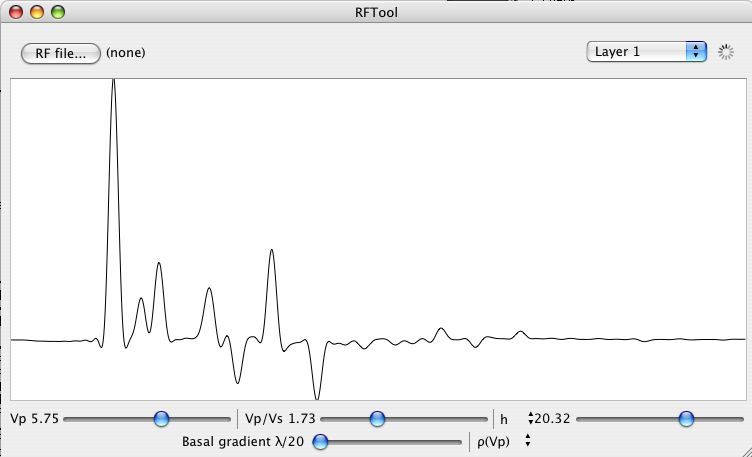RFTool
RFTool is an interactive, GUI-based tool to simulate P or S receiver functions.
It is basically a front-end to a reflectivity synthetic program and a
receiver function (RF) calculation program.
Every time the user changes a parameter, the RF is recomputed and shown in
a graphical display.
The new RF can be overlaid with a plot of a comparison RF for modelling work.
The objectives are to provide fast feedback from changes in structural
parameters to rapidly develop intuition on how receiver functions respond,
and to generate approximate structural models for formal inversion.
Download compiled binaries for MacOS X systems from 10.3 onwards from
here..
version 0.63 (built 04 May 2024).

The screen shot of RFTool shows a receiver function response of an average
crustal model (AK135), with discontinuities at 20 and 35 km.
The properties in the layers in the structure (selected by the button at the
top right) can be changed by moving the sliders at the base.
As the sliders are moved, the receiver function is dynamically recalculated,
letting you see how it responds to structure.
You can load an observed receiver function (button at top left) and overlay
it for comparison to do rough structural modelling by successively adding
layers.
Once the desired fit is achieved, the receiver function trace,
or the structural model,
may be saved for further work.
More features described in the online "About RFTool" menu item.
There is no academic publication on RFTool.
Until such time as there is, these citations should be used for documenting
its operation:
-
Randall, G. E. (1989) Efficient calculation of differential seismograms for lithospheric receiver functions, Geophys. J. Int. 99, 469-491.
-
Helffrich, G. (2006) Extended-time multi-taper frequency domain cross-correlation receiver function estimation, Bull. Seismo. Soc. Am. 96, 344-347.
-
Ligorria, J. P and Ammon, C. J. (1999) Iterative deconvolution and receiver function estimation, Bull. Seismo. Soc. Am. 89, 1395-1400.
-
Langston, C. (1979) Structure under Mount Rainier, Washington, inferred from teleseismic body waves, J. Geophys. Res. 84, 4749-4762.
Some previous releases are available through the release name in the list
below.
Changes potentially incompatible with previously-working RFTool versions
indicated in italics.
-
0.63
- ARM (Apple Silicon) and Intel versions available.
-
0.62
- Rho profile in structure profile dashed to distinguish from Vs.
Bug fixes:
- paste of structural model failed.
-
0.60
- 64-bit release. Q control in each layer stripped out.
-
0.53
- Added control over Q in each layer.
Bug fixes:
- copy/paste of structural models with fewer layers led to failure;
- mismatch between trace point count and trace sigma point count led to
failure.
[Repackaged 04:00 16 Feb. 2015 (GMT) to fix execution problems on Yosemite
systems]
-
0.52
- Implement liquid layers in model.
-
0.51
- Online help provided through the Help menu.
Window expansion behaves more reasonably.
-
0.50
- S receiver function calculation implemented as well as P. Type choosable
by radio buttons in "Preferences..." pane in main menu. (S RFs not
yet implemented using the time domain calculation method. Frequency domain
are OK though.)
-
0.41
- Selection of alternate RF calculation methods made easier; choosable by
radio buttons.
Add switch and control panel drawer to continuously vary slowness.
-
0.40
- Add structure visualization panel and keyboard navigation up and down in
layer stack.
-
0.36
- Fix bug in Intel version that would cause occasional failure running
on 10.5 (Leopard) systems.
-
0.35
- Public release.
Comments or complaints to
George Helffrich

